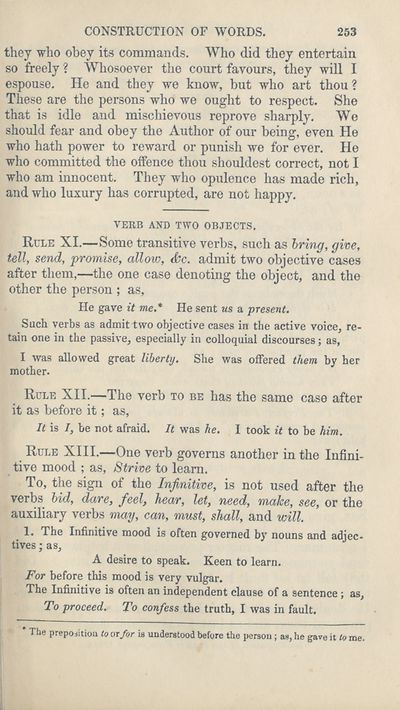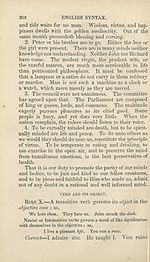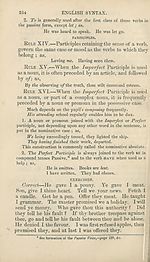Books and other items printed in Gaelic from 1841 to 1870 > Double grammar, of English and Gaelic, in which the principles of both languages are clearly explained
(255) Page 253
Download files
Complete book:
Individual page:
Thumbnail gallery: Grid view | List view

253
CONSTRUCTION OF WORDS.
they who obey its commands. Who did they entertain
so freely ? Whosoever the court favours, they will I
espouse. He and they we know, but who art thou ?
These are the persons who we ought to respect. She
that is idle and mischievous reprove sharply. We
should fear and obey the Author of our being, even He
who hath power to reward or punish we for ever. He
who committed the offence thou shouldest correct, not I
who am innocent. They who opulence has made rich,
and who luxury has corrupted, are not happy.
VERB AND TWO OBJECTS.
Rule XI.—Some transitive verbs, such as bring, give,
tell, send, 'promise, allow, &c. admit two objective cases
after them,—the one case denoting the object, and the
other the person ; as,
He gave it me.* He sent us a present.
Such verbs as admit two objective cases in the active voice, re¬
tain one in the passive, especially in colloquial discourses; as,
I was allowed great liberty. She was offered them by her
mother.
Rule XII.—The verb to be has the same case after
it as before it; as,
It is 7, be not afraid. It was he. I took it to be him.
Rule XIII.—One verb governs another in the Infini¬
tive mood ; as, Strive to learn.
To, the sign of the Infinitive, is not used after the
verbs bid, dare, feel, hear, let, need, make, see, or the
auxiliary verbs may, can, must, shall, and will.
1. The Infinitive mood is often governed by nouns and adjec¬
tives ; as,
A desire to speak. Keen to learn.
For before this mood is very vulgar.
The Infinitive is often an independent clause of a sentence ; as,
To proceed. To confess the truth, I was in fault.
■ The preposition to or for is understood before the person ; as, he gave it to me.
CONSTRUCTION OF WORDS.
they who obey its commands. Who did they entertain
so freely ? Whosoever the court favours, they will I
espouse. He and they we know, but who art thou ?
These are the persons who we ought to respect. She
that is idle and mischievous reprove sharply. We
should fear and obey the Author of our being, even He
who hath power to reward or punish we for ever. He
who committed the offence thou shouldest correct, not I
who am innocent. They who opulence has made rich,
and who luxury has corrupted, are not happy.
VERB AND TWO OBJECTS.
Rule XI.—Some transitive verbs, such as bring, give,
tell, send, 'promise, allow, &c. admit two objective cases
after them,—the one case denoting the object, and the
other the person ; as,
He gave it me.* He sent us a present.
Such verbs as admit two objective cases in the active voice, re¬
tain one in the passive, especially in colloquial discourses; as,
I was allowed great liberty. She was offered them by her
mother.
Rule XII.—The verb to be has the same case after
it as before it; as,
It is 7, be not afraid. It was he. I took it to be him.
Rule XIII.—One verb governs another in the Infini¬
tive mood ; as, Strive to learn.
To, the sign of the Infinitive, is not used after the
verbs bid, dare, feel, hear, let, need, make, see, or the
auxiliary verbs may, can, must, shall, and will.
1. The Infinitive mood is often governed by nouns and adjec¬
tives ; as,
A desire to speak. Keen to learn.
For before this mood is very vulgar.
The Infinitive is often an independent clause of a sentence ; as,
To proceed. To confess the truth, I was in fault.
■ The preposition to or for is understood before the person ; as, he gave it to me.
Set display mode to:
![]() Universal Viewer |
Universal Viewer | ![]() Mirador |
Large image | Transcription
Mirador |
Large image | Transcription
Images and transcriptions on this page, including medium image downloads, may be used under the Creative Commons Attribution 4.0 International Licence unless otherwise stated. ![]()
| Permanent URL | https://digital.nls.uk/106542825 |
|---|
| Description | Out-of-copyright books printed in Gaelic between 1631 and 1900. Also some pamphlets and chapbooks. Includes poetry and songs, religious books such as catechisms and hymns, and different editions of the Bible and the Psalms. Also includes the second book ever published in Gaelic in 1631. |
|---|

